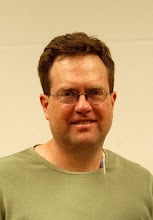I have now read Bill Shunn's memoir The Accidental Terrorist: Confessions of a Reluctant Missionary. It is a brilliant piece of writing, made even more so by the lengths to which Bill went, utilizing the services of a world-class editor, to produce the definitive version of the book. I have always liked Bill's writing, as it takes him little effort to serve up some tasty literary "cheeseburgers"; however, the published version of The Accidental Terrorist is truly a slice of filet mignon to be savored with gusto. I miss some of the humor that was edited out of earlier incarnations of the story -- especially the inside jokes or references that only active Mormons could "get" fully -- but I appreciate Bill's motivation in giving it a serious treatment for its formal unveiling. (I also appreciate his mentioning me in his author's acknowledgments.)
Although I remain an active member of the LDS church, I share much of Bill's perspective on the notion of serving two years as a Mormon missionary, particularly the often-bleak outlook of a new missionary just starting out and the sheer impossibility of a missionary's spending all of his designated proselytizing time "fruitfully" or even fully engaged. I well remember my early days as a missionary in Chile in 1979. My adjustment to mission life in a foreign country was especially hard-fought (and only barely won), although I had an "advantage" that Bill didn't have in Canada, in that I could not have left my mission on the sly -- all roads home passed through my mission president and the full weight of Chilean and American immigration and customs officials. Thus, when I arrived in Chile I was committed to stay for the duration. Also, unlike Bill, I didn't feel particularly anguished about giving up two years of my life (though admittedly it was a great sacrifice in retrospect); I had neither great plans nor a girlfriend to put on hold. Still, I distinctly remember wondering if I'd ever really come home or if I'd be doomed to knock on people's doors for eternity.
However, when it came to active missionary work, I possibly had it even tougher in Chile than did Bill in Alberta (or, later, in Washington and Idaho). In my mission, we typically tried to be judicious in baptizing teenage girls or single women, so when we went out and tried to find people to teach about the church, we looked for entire families with fathers who might one day provide church leadership. Unfortunately, most Chilean men's work schedules took them away from home until about 7:00 pm on weekdays, so that meant we had about a three-hour window of potentially "productive" time every evening for "tracting" and teaching. Given that we were expected to proselytize for up to ten hours per day, that left a lot of time to fill. We tried lots of things, but "street contacting" was particularly pointless in Chile; almost invariably, the contact would, in order not to be rude in the moment but also not to be bothered further, give a false address. (I hated stopping people on the street in any case.) Thus we ended up spending a lot of time in members' homes doing nothing in particular. Thankfully, I didn't break the most-serious of mission rules -- nor did I break less-serious rules in so persistent a manner that it became serious in my leaders' eyes -- but, for me, as for most of the missionaries presented in The Accidental Terrorist, proselytizing hours ended up being largely an exercise in creative time-wasting. That caused me to feel a sense of shame that, though it diminished over time, continues to overshadow my memories of the huge, mostly diligent effort that I did expend in trying to "further the kingdom" in Chile.
Of course, Bill, being an "ex-Mo," presents his missionary memoir from a distinctly critical point of view concerning (a) the various doctrinal, historical, and cosmological claims the church makes, (b) the life of Joseph Smith, the church's founder, and (c) the "guilt" culture that impels so many of its young people -- especially, still, its young men -- to take a huge bite out of their lives to serve church missions. I don't share most of that part of Bill's perspective, but I will say this: so much of a Mormon young man's training is directed at preparing him to serve a proselytizing mission that it shouldn't amaze anyone that many missionaries come home wondering, anticlimactically, "What now?" Having been a missionary, no matter the level of one's diligence, doesn't automatically make one a great breadwinner, head of family, husband, father, or administrator; thus I feel it does young Mormon men a great disservice not to allow them to gaze farther into the future and to view their missions, rightfully, as one step on a larger path.
Thursday, October 15, 2015
Subscribe to:
Comments (Atom)

